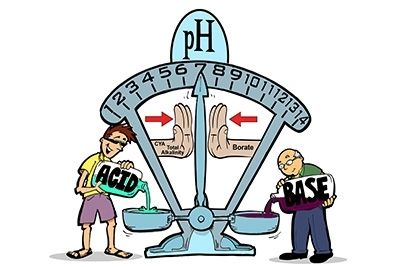Resources
Browse Our Resources
Tags: Inground Pools, Pool Chemicals, Pool Service
Are Borates in a Swimming Pool a Smart Investment?
Are Borates in a Swimming Pool a Smart Investment?
Owning a swimming pool comes with its fair share of maintenance tasks, from balancing chemicals to preventing algae growth. In recent years, borates have emerged as a popular additive in pool care, promising to enhance water quality and reduce chemical fluctuations. But do the benefits justify the cost? Let’s dive into the value of using borates in a swimming pool and determine whether they are a worthwhile investment.
Understanding Borates and Their Role in Pools
Borates are chemical compounds derived from boron, a naturally occurring element found in soil, minerals, and water. When used in swimming pools, borates—often in the form of boric acid, sodium borate, or borax—offer multiple benefits that improve overall water quality and stability.
Rather than replacing chlorine or other sanitizers, borates function as a supporting agent, helping to regulate pH levels, prevent algae growth, and enhance water comfort. This makes them a valuable tool for pool owners looking to simplify maintenance while improving the swimming experience.
Key Benefits of Using Borates
- Maintaining pH Balance
- One of the primary advantages of borates is their ability to stabilize pH levels. Pool water is prone to fluctuations, which can make chlorine less effective and lead to skin and eye irritation. Borates help buffer these changes, reducing the need for frequent pH adjustments and saving money on pH balancing chemicals.
- Algae Prevention
- Algae is a persistent issue in pools, requiring additional chlorine and algaecides to control. Borates disrupt algae metabolism, making it more difficult for it to grow. This helps keep pool water clear and reduces reliance on expensive algaecides over time.
- Enhanced Water Feel
- Swimmers often notice a difference in water quality when borates are present. The water feels softer and silkier, leading to a more comfortable swimming experience. This also helps minimize skin and eye irritation, making borates particularly beneficial for those with sensitive skin.
- Boosting Chlorine Efficiency
- Because borates help stabilize pH, they allow chlorine to work more effectively. With pH kept in the optimal range, chlorine doesn’t degrade as quickly, meaning pool owners can use less chlorine while maintaining sanitation. This translates to long-term cost savings on chlorine purchases.
- Preventing Scale Buildup
- High calcium levels and fluctuating pH can lead to scale buildup on pool surfaces and equipment. By keeping pH in check, borates help reduce the formation of scale, prolonging the lifespan of pool components and minimizing maintenance costs; especially salt chlorine generators.
Evaluating the Costs of Borates
While borates offer clear advantages, they come with an initial investment. The cost varies depending on the size of the pool and the form of borates used:
- Boric Acid: The most commonly used borate for pools, costing $125–$200 to achieve the recommended 30–50 ppm (parts per million) level in an average-sized pool.
- Borax or Sodium Borate: These alternatives can be used but will require more pH adjustments, potentially increasing maintenance costs over time, as they are not pH neutral products.
The good news is that borates do not break down like chlorine. Once added, they remain in the water until diluted through splash-out, backwashing, or draining, meaning they do not need frequent replenishment. Typically, you only need to add borates to your pool once a year.
Are Borates Worth the Investment?
Whether borates are worth the cost depends on several factors, including your maintenance habits and budget. Here’s when they make the most sense:
Ideal Scenarios for Using Borates:
- You want to reduce pH fluctuations and maintain a stable water balance.
- You struggle with persistent algae problems and want to lessen reliance on algaecides.
- You prefer softer, more comfortable water that minimizes skin and eye irritation.
- You want to improve chlorine efficiency and reduce overall chemical expenses.
- You aim to protect pool surfaces and equipment from scale buildup.
Situations Where Borates Might Not Be Necessary:
- Your pool already has consistent water chemistry without additional additives.
- You’re on a tight budget and prefer to manage pH manually.
- Your pool experiences frequent water loss through draining or backwashing, which could require more frequent borate replenishment.
- You have pets that drink pool water, as high borate levels can be harmful if consumed in large quantities.
Conclusion: Are Borates Worth the Money?
For many pool owners, borates provide a noticeable improvement in water quality and maintenance efficiency. Their ability to stabilize pH, prevent algae, and enhance chlorine performance makes them a valuable long-term investment. While the upfront cost may seem significant, the potential savings on chlorine, algaecides, and pH-balancing chemicals can make borates a cost-effective choice.
If you’re looking for a way to simplify pool care, improve swimmer comfort, and extend the life of your pool equipment, borates may very well be worth the investment.

